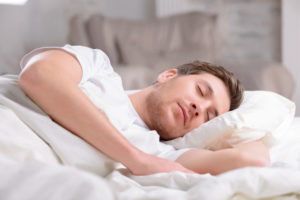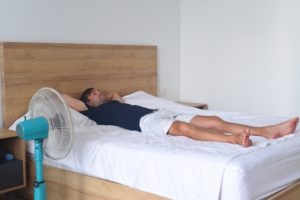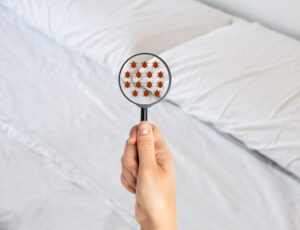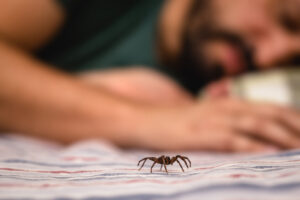When you buy through our links, we may earn a commission. Products or services may be offered by an affiliated entity. Learn more.
Why Are My Feet Hot at Night?
As the body prepares for sleep, it lowers core body temperature by increasing blood flow to the hands and feet. This process, known as distal vasodilation, can make your feet feel hot at night. The increased peripheral blood flow to the feet and hands typically helps you fall asleep faster.
But for some people, the warmth in the feet may become an unpleasant burning sensation when vascular or nerve dysfunction is present. We discuss some of the most common causes of burning feet that can interrupt sleep and ways to alleviate these symptoms.
Looking to improve your sleep? Try upgrading your mattress.
Burning Feet Syndrome
Burning feet syndrome is characterized by painful, hot feet. Some people may feel a dull ache or heaviness running up their legs.
Burning feet syndrome may be due to problems in distal blood flow or dysfunction of the peripheral nerves when sensing pain and temperature . Distal blood flow is the movement of blood outside the central trunk of the body, and peripheral nerves are the nerves in the arms, hands, legs and feet. When damage to peripheral nerves causes discomfort, it is referred to as peripheral neuropathy.
A variety of disorders can cause burning feet syndrome, so diagnosis includes a physical exam combined with a clinical history to determine if the symptoms relate to an underlying medical condition, a circulation disorder, or nerve damage. Sometimes the cause can be due to psychological factors or remain unknown.
“Foot discomfort is a common cause of sleep disruption. Bring this up with your doctor and seek an evaluation. Effective treatments can be tailored to the specific cause.”
Dr. Abhinav Singh, Sleep Physician
Hormonal Changes
During certain times of hormonal change, such as pregnancy and menopause, hot flashes at night are fairly common. These hot flashes or night sweats increase circulation and lead to vasodilation. The increased blood flow causes a sudden rise in temperature starting in the fingers and toes, leading to hot, burning sensations in the feet.
During menopause, peripheral neuropathy may occur due to the declining levels of reproductive hormones . This type of nerve damage combined with hot flashes at night may lead to stinging, burning foot discomfort that can disturb sleep.
Hormonal shifts can also result in extra sensitive skin by amplifying any discomfort, creating the sensation of hot prickly feet. But if the increased blood flow at night leads to persistent shivering or sweating, discuss these symptoms with your health care provider.
Nerve Dysfunction
Some nerve damage first develops in the nerve endings farthest away from the brain and spinal cord, so people with peripheral nerve damage may experience symptoms that start in the feet. Paresthesia, or the sensation of burning and numbness, in the feet may worsen at bedtime and occur due to many conditions that involve dysfunction of the peripheral nerves.
- Autoimmune diseases: Autoimmune diseases like Guillain-Barre syndrome (GBS) or lupus can cause peripheral neuropathies that lead to painful, burning hot feet.
- Infections: Infections like Lyme disease or human immunodeficiency virus (HIV)may injure distal nerve endings. Painful, burning feet due to peripheral nerve damage occurs in 20% of people with HIV.
- Injuries: Accidents, medical procedures, or body stress from repetitive activities can crush, compress, and stretch nerves. These injuries to the peripheral nerves may cause burning pain and swelling in the feet.
- Genetics: Some rare inherited conditions like Charcot-Marie-Tooth disease (CMT) can damage the nerves and cause peripheral neuropathy that often starts with pain and numbness in the feet. CMT affects about 100,000 people in the U.S.
Depending on how and where nerves were injured, the treatment for nerve damage can vary.
Nutritional Deficiencies
Good nutrition and vitamins are critical to cell growth and function as well as sleep. When the body does not get enough of a vitamin, deficiency may occur and lead to peripheral neuropathy. People with conditions that disrupt digestion and the body’s ability to absorb nutrients are at risk for vitamin deficiencies and peripheral neuropathies .
- Vitamin B12:About 20% of people aged 60 and older have vitamin B12 deficiency. Gastrointestinal problems or certain types of anemia may prevent the body from absorbing vitamin B12.
- Vitamin B1: Vitamin B1 deficiency, also called a thiamine deficiency, often occurs with chronic alcohol use. Dry beriberi, a type of peripheral neuropathy characterized by burning in the hands and feet, may occur with chronic thiamine deficiency.
- Vitamin B5: Vitamin B5 deficiency is very rare and can be caused by a genetic condition that inhibits the absorption of pantothenic acid. Vitamin B5 deficiency can cause burning feet syndrome.
- Vitamin B6: Vitamin B6 helps the body produce enzymes that enable metabolic processes. Both deficiency and excess of vitamin B6 can cause peripheral neuropathy and painful, burning feet.
- Folate: Excessive alcohol consumption can limit folate absorption and the development of peripheral neuropathy. This painful tingling starts as a prickling or numbness in the feet that frequently happens at night.
The diagnosis of a vitamin deficiency involves a clinical history, physical exam, and laboratory testing. Treatment often focuses on vitamin replacement and monitoring symptoms in response to vitamin supplementation. But vitamin B12 and folate deficiency may require additional testing to identify any underlying medical conditions driving low vitamin levels.
Metabolic and Endocrine Disorders
Metabolic and endocrine disease can damage the peripheral nerves and lead to tingling pain in the lower limbs.
- Diabetes: Diabetes can cause a rise in blood sugar that may lead to peripheral neuropathy, causing painful hot sensations in the toes and feet that get worse at night. Sometimes these aching, sharp sensations make touching the bed sheets unbearable and disrupt sleep.
- Kidney disease: Uremic polyneuropathy, a type of nerve damage common in end-stage kidney disease, causes tingling and prickling in the extremities. Nearly half of the people with chronic kidney disease experience “paradoxical heat sensations” in their feet , meaning cold temperatures register as hot.
- Hypothyroidism: Hypothyroidism may manifest in fatigue, cold intolerance, weight gain, dry skin, and various neurological disorders . In some cases, peripheral neuropathy develops and causes burning, tingling feet that often get worse near bedtime.
A medical history, physical, and neurological exam may help diagnose neuropathy. Additional evaluation may involve laboratory and genetic testing as well as tests to evaluate nerve function.
Erythromelalgia
Erythromelalgia is a rare syndrome that causes severe pain, burning, and swelling in the feet and hands. The symptoms may worsen as blood flow increases to the feet at night.
Although the cause of erythromelalgia is not well understood, distal vasodilation, peripheral neuropathy, and genetics may be involved . Less than 10% of erythromelalgia cases are associated with a group of diseases called myeloproliferative disorders. Treatment options typically focus on relieving symptoms with lifestyle changes, topical creams, or aspirin.
How to Cool Down Your Feet at Night
If you’re experiencing uncomfortably hot or burning feet at night or during the day, there are steps you can take at home to alleviate these sensations.
- Cool your feet: Use chilled water or a fan to cool your feet for 5 to 10 minutes, every few hours. Avoid putting ice directly against your feet.
- Apply topical creams: Topical creams and patches that contain lidocaine or capsaicin may provide some relief from pain. It is best to consult with a health care provider before using medications.
- Wear comfortable clothing: Use breathable, cotton socks during the day and sleep in lightweight, moisture-wicking bed cloths at night to help regulate body temperature.
- Use comfortable shoes: Get shoes with arch supports or wear open-toed shoes to help increase the comfort of your swollen, painful feet.
- Adjust room temperature: Most people consider a temperature of 65º to 68º to be the most comfortable for sleep. Consider how to keep the bedroom cool before bedtime.
When to See a Doctor
Sensations like burning, painful feet that interfere with a good night’s sleep may be caused by another medical condition or disorder. Contact a health care provider if you experience the following symptoms in your feet:
- Burning, tingling, or persistent pain
- Swelling of a joint, redness, fever, or an open wound
- Bleeding, bruising, or sudden severe pain disrupting sleep or daily activity
- Swelling, redness, or pain in conjunction with diabetes or circulation disorder
- Worsening symptoms that do not improve after one to two weeks of home treatment or that are regularly interfering with sleep
Examinations for painful, burning feet are an important part of maintaining one’s well-being when you have a metabolic, circulation, or medical disorder that disrupts sleep . Foot ulcers, infections, and neuropathy can cause burning sensations.
Speak with your doctor about any burning, cracks in the skin, fissures, calluses, redness, or other problems with your feet. If your foot is warm to the touch or swollen with red streaks, talk with your health care provider since these symptoms may indicate signs of an infection.

Still have questions? Ask our community!
Join our Sleep Care Community — a trusted hub of sleep health professionals, product specialists, and people just like you. Whether you need expert sleep advice for your insomnia or you’re searching for the perfect mattress, we’ve got you covered. Get personalized guidance from the experts who know sleep best.
References
11 Sources
-
Makkar, R. P., Arora, A., Monga, A., Gupta, A. K., & Mukhopadhyay, S. (2003). Burning feet syndrome. A clinical review. Australian Family Physician, 32(12), 1006–1009.
https://pubmed.ncbi.nlm.nih.gov/14708150/ -
Santen, R. J., Loprinzi, C. L., & Casper, R. F. (2022, October 24). Menopausal hot flashes. In R. L. Barbieri, & W. F. Crowley, Jr. (Eds.). UpToDate., Retrieved April 21, 2023, from
https://www.uptodate.com/contents/menopausal-hot-flashes -
Singh, A., Asif, N., Singh, P. N., & Hossain, M. M. (2016). Motor nerve conduction velocity in postmenopausal women with peripheral neuropathy. Journal of Clinical and Diagnostic Research, 10(12), CC13–CC16.
https://pubmed.ncbi.nlm.nih.gov/28208850 -
National Institute of Neurological Disorders and Stroke. (2023, March 13). Peripheral neuropathy., Retrieved April 10, 2023 from
https://www.ninds.nih.gov/health-information/disorders/peripheral-neuropathy -
Hammond, N., Wang, Y., Dimachkie, M. M., & Barohn, R. J. (2013). Nutritional neuropathies. Neurologic Clinics, 31(2), 477–489.
https://pubmed.ncbi.nlm.nih.gov/23642720/ -
Mohila, C. A. (2018, July 30). Vitamin B nutritional disorders. Medscape., Retrieved April 21, 2023, from
https://emedicine.medscape.com/article/1743973-overview#showall -
Tavee, J., & Zhou, L. (2009). Small fiber neuropathy: A burning problem. Cleveland Clinic Journal of Medicine, 76(5), 297–305.
https://pubmed.ncbi.nlm.nih.gov/19414545/ -
Palmer, B. F. (2023, February 10). Uremic polyneuropathy. In J. S. Berns, (Ed.). UpToDate., Retrieved April 10, 2023, from
https://www.uptodate.com/contents/uremic-polyneuropathy -
Noor, E. M. (2021, July 20). Metabolic neuropathy clinical presentation. Medscape., Retrieved April 10, 2023, from
https://emedicine.medscape.com/article/1171051-clinical#showall -
Davis, M. D. P. (2022, January 28). Erythromelalgia. In Callen, J. (Ed.). UpToDate., Retrieved April 10, 2023, from
https://www.uptodate.com/contents/erythromelalgia -
Wexler, D. J. (2021, September 23). Evaluation of the diabetic foot. In Nathan D. M. (Ed.). UpToDate., Retrieved April 21, 2023, from
https://www.uptodate.com/contents/evaluation-of-the-diabetic-foot




























